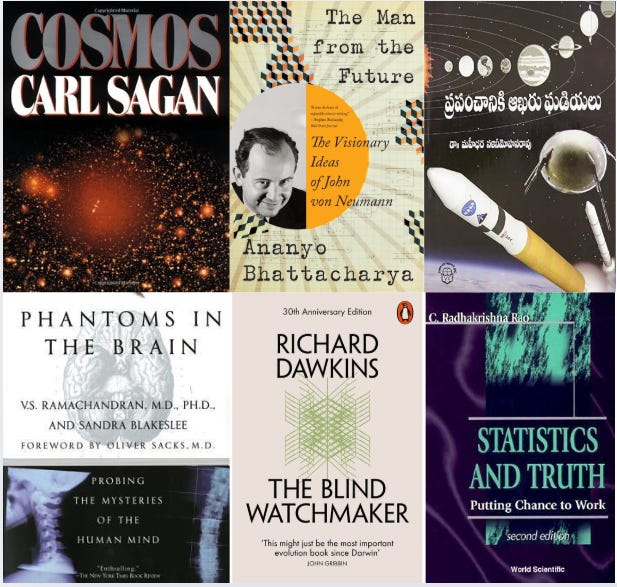In బాలగోపాల్ సైన్స్ వ్యాసాలు / Balagopal Essays on Science, there is one argument about how science and knowledge today lack integrity and history.
Firstly, integrity. He argued about how knowledge is broken and boxed today. When productivity becomes the only motive to do science, it pushes science in the direction of ever-increasing specialization. This productivity-seeking is obviously not wrong, but it has consequences. A scientist would be an expert in one field but would hold superstitious ideas in others. In the essay “Value of Science,” Richard Feynman wrote “ a scientist looking at nonscientific problems is just as dumb as the next guy.” Balagopal would rephrase it as: “a scientist looking at problems outside their field is just as dumb as the next guy.”
Secondly, history. Every scientific advancement was a response to some human problem. Solving one problem only led to another, and science branched out like the etymology of a word, along countless pathways. Balagopal argued that there is little incentive to learn and teach this history when schools and colleges are viewed just as factories manufacturing labor for industry. A simplistic example: we were useful to the IT industry when we just knew how to code. The history of Information theory, which is written brilliantly by James Gleick in Information, is not so useful. Thus, even Computer Science students rarely learn about that.
The major consequence of science losing its integrity and history is the lack of scientific temper.
Balagopal is hopeful that popular science books would fill these gaps, at least in part. They would connect different branches of science and tell their histories. Carl Sagan’s books fulfilled this role for me. His books made me curious about science and helped me see it as not just a livelihood opportunity. I also like to read biographies of scientists for this reason. Cosmos, John von Neumann’s biography, Phantoms in the brain, The blind watchmaker, Statistics and Truth, and ప్రపంచానికి ఆఖరి ఘడియలు are my favorites. What are yours?
On that note, here is something exciting!
Srinivas Kodali started a book club, “Uncharted Science,” in Hyderabad to read popular science books. It started with the book “A City on Mars.” It is a witty book that discusses if we can build a city on mars and also if we should. He wants to build a science community in Hyderabad. Check it out if you’re interested.
I gave a presentation called “Openness as a Strategic Choice” to the Network for Advanced Study of Technology Geopolitics (NAST) Fellows of Takshashila Institution. You can find my talking points for the webinar here: Script | Video
I explored the intersection of open-source technologies and geopolitics in this.
It was a good reading session at Model Thinker reading group. We read about Normal distributions, much more deeply. Statistics textbooks generally say that data on adult male heights is normally distributed. But why? We found an answer to that: Why do we say heights data is normally distributed?
I played poker for the first time in my life and the government banned online money-based games.
Thejesh is doing a short survey on where bengaluru people work from. He needs 1100 responses for statistically significant results. If you are from Bengaluru, please fill it out. Bengaluru—Where Do You Work From?
Washed Away: A nice map of flood inundation in India by Down to Earth.





